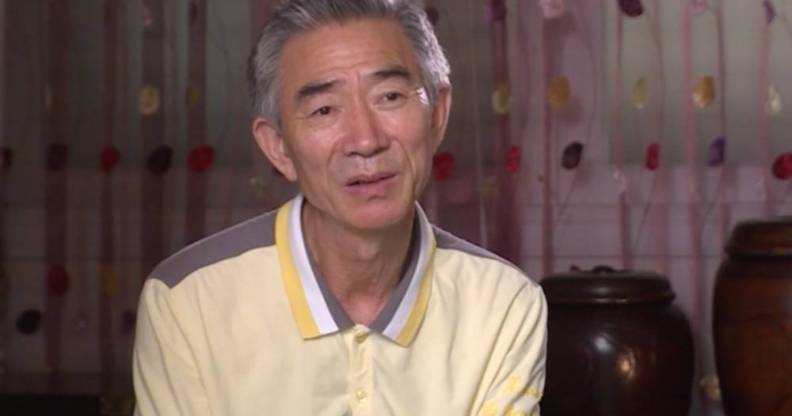North Korea’s ‘only gay defector’ to marry American boyfriend after falling in love during lockdown

Jang Yeong-jin speaks to CNN about what it was like living as a gay man in North Korea and how he escaped the oppressive regime in 1996. (CNN)
Jang Yeong-jin, North Korea’s ‘only openly gay defector‘, has found love during lockdown and now plans to marry his American boyfriend.
Jang, 62, met Korean-American restaurant owner Min-su, an assumed name given to the man in the BBC article, last year on a dating site. Only four months later, he flew to the US to meet Min-su, and Jang told the BBC that the lockdown brought on by COVID gave the couple the ability to get to know each other better.
He said they want to get married later this year.
Jang Yeong-jin said he first learned about homosexuality from a magazine in the spring of 1998, just 13 months after he first arrived in South Korea. He described how he opened a magazine to read an interview he had given about his heroic journey from North Korea. When he turned the page, Jang said he discovered an article about gay men coming out accompanied by a scene from an American movie that showed two men kissing.
“When I saw that, I knew right away that I was this kind of person,” Jang said. “That’s why I couldn’t like women.”
He told the BBC that he had experienced a series of devastating incidents after coming out, including dating a partner who stole all of Jang’s savings after convincing him to move in together.
In 2020, Jang Yeong-jin decided to start dating again, and he met Min-su online. He eventually decided to fly to the US to meet Min-su. Soon after they met, the US went into lockdown because of COVID, and the pair took the time to get to know each other better.
After just two months of living together, Min-su proposed to Jang.
‘We are good for each other’
“The more I got to know this man, the more I could see that he had a very good character,” Jang Yeong-jin told the BBC. “Although he is eight years younger than me, he is the kind of person who likes to care for others first.”
He said he is now in the process of finalising documents to prove his first marriage in North Korea is over, and the couple hopes to marry later this year.
“I am a very introverted and sensitive person, but he is an optimistic man so we are good for each other,” Jang said.
He added that he looks forward to lockdowns easing so he can visit gay bars in Washington with Min-su. But Jang said he still enjoys living with his fiance in the suburbs which he told the BBC is like being in a “fairytale”.
Jang Yeong-jin made headlines in 2015 after he published a memoir about his life as a gay man in North Korea.
He told the Guardian that the reclusive Asian nation has “no concept of homosexuality”, and there is “no awareness” of LGBT+ issues. Jang said: “In open societies, people have at least a consciousness of different sexualities, in North Korea, there is no hope.”
He said men in North Korea spend “a long time in the military” – Jang Yeong-jin completed 10 years of national service himself – so “physical contact is frequent between the same-sex”, and people “experience special emotional bonds”.
“This isn’t to say that all these men are gay, but rather, they are tied by a special comradeship,” Jang said.
Once he finished his compulsory military service, Jang married a woman, but problems with his marriage led him to defect to South Korea. However, the decision is risky and dangerous.
People who choose to leave North Korea face the physically dangerous and arduous task of fleeing to China or another country to eventually seek asylum in South Korea. Jang Yeong-jin told CNN that he fled across the border into China in 1996, where he struggled for over a year to find a way into South Korea.
However, China does not consider North Koreans as refugees or defectors, and if they are caught in the country, they will often be sent back to face punishment, imprisonment or even death in North Korea.
Jang made the incredibly dangerous decision to re-enter North Korea, travel south and cross the demilitarised zone (DMZ) – a four-kilometre, heavily watched border between North and South Korea – into South Korea. He arrived in South Korea in 1997 and was debriefed for five months by government officials before he could start his new life.

